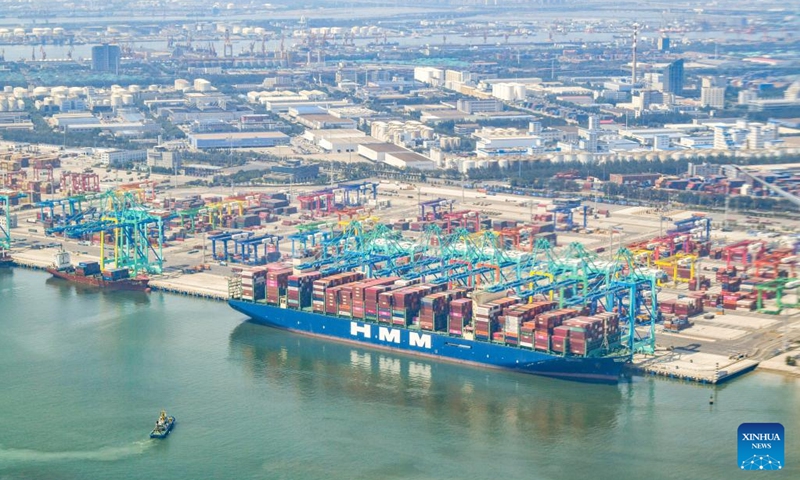
This aerial view taken on June 16, 2023 shows a container ship berthing at the Tianjin Port in north China's Tianjin Municipality. Photo: Xinhua
China has never deliberately sought a trade surplus with the EU, which is a natural result of the combined influence of different industrial structures, industrial specialization, methods of trade and external factors, a spokesperson of the Chinese Ministry of Foreign Affairs said on Tuesday, in a fresh reiteration on bilateral trade issues.
The remarks were made in response to a media question over whether Brussels will press Beijing to reduce barriers to European exports at a high-level meeting in September.
In a recent media interview, European Commission Executive Vice-President and Trade Commissioner Valdis Dombrovskis said that "the China-EU trading relationship is very unbalanced. China is running a huge trade surplus, and the level of openness from the Chinese side is not the same as the level of openness from the EU side."
For years, the majority of EU companies in China have gained huge benefits from bilateral trade, which is the fundamental reason why these companies have chosen to operate and expand in China, the spokesperson said.
"The EU restrictions on exports of high-tech products to China in recent years directly limited the EU's ability to tap the potential of exports to China and led to trade imbalances. If the EU truly wants to address this issue, it needs to lift export controls against China, rather than putting the blame on China," the spokesperson noted.
Experts said that the so-called trade imbalance is an old claim that has often been brought up as an EU "card" targeting China in seeking more market entry.
"The issue of trade imbalance between China and Europe has been raised by the European side for several years, with both sides holding quite divergent viewpoints… if we were to consider market principles, now would be the time for Europe to refrain from debating other factors and instead address its own declining product competitiveness," Cui Hongjian, director of the Department of European Studies at the China Institute of International Studies, told the Global Times on Tuesday.
Due to the decrease in the competitiveness of EU products in the international market, especially in a highly internationalized market like China's, many of these products struggle to compete with those from China, Cui said, noting that "such blame cannot solely be placed on China."
"Regrettably, the so-called trade imbalance has effectively become a card for Europe, leveraging it to exert pressure on China, particularly using it as leverage to demand greater market access in China," Cui said.
China and Europe have formed a strong economic symbiotic relationship. In 2022, bilateral trade reached 856.3 billion euros ($937 billion), up 23.1 percent year-on-year, and the average daily trade scale exceeded 2 billion euros.
While there has been a certain trade deficit, China's stable supply chain and value-for-money products provide tangible benefits to European consumers, who are facing rising difficulties from high inflation and geopolitical conflicts, experts said.
The trade surplus debate came amid relentless efforts by some EU politicians to de-risk in the area of China-EU cooperation, with so-called national security being brought up again as a guise for decoupling.
The German government is currently reviewing whether certain components from Chinese technology companies Huawei and ZTE should be banned from its telecoms networks, amid broader concerns about the influence of Chinese companies on critical infrastructure, Reuters reported.
If a decision for replacement takes place, the German national railway operator would have to spend up to 400 million euros to replace all the components in its infrastructure supplied by Chinese tech giant Huawei Technologies, according to Spiegel magazine on Friday.
Xiang Ligang, director-general of the Beijing-based Information Consumption Alliance, told the Global Times that the German government's move may be closely following US steps to ban Chinese technology companies from taking part in its economic development.
"Have Huawei's facilities had any technical problems or safety issues? The answers are self-evidently no… the German side owes an explanation regarding the replacement," Xiang said.
Replacing facilities made by Chinese companies makes no sense except for achieving a politically driven goal to decouple from China, the expert said. Economically, such moves have been very difficult, given the high costs.
Similar to the German case, the US Congress authorized an equipment replacement program amid concerns that Chinese suppliers such as Huawei "threatened" US national security.
Many smaller regional carriers have installed Huawei equipment in their networks years ago. While the project has largely bipartisan support in the country out of a clear political purpose targeting China, it has failed to have enough funding, according to media reports.
In light of Europe's current focus on what is being taken as institutional competition with China, coupled with the perception of certain high-tech Chinese enterprises as potential security risks, Cui said that this perspective lacks both sound reasoning and substantiating proof.
Similar to the examination of the trade deficit issue, experts said that Europe should critically evaluate its own internal factors rather than consistently seek fault within the realm of routine trade, investment collaboration, or associations with Chinese corporations.




